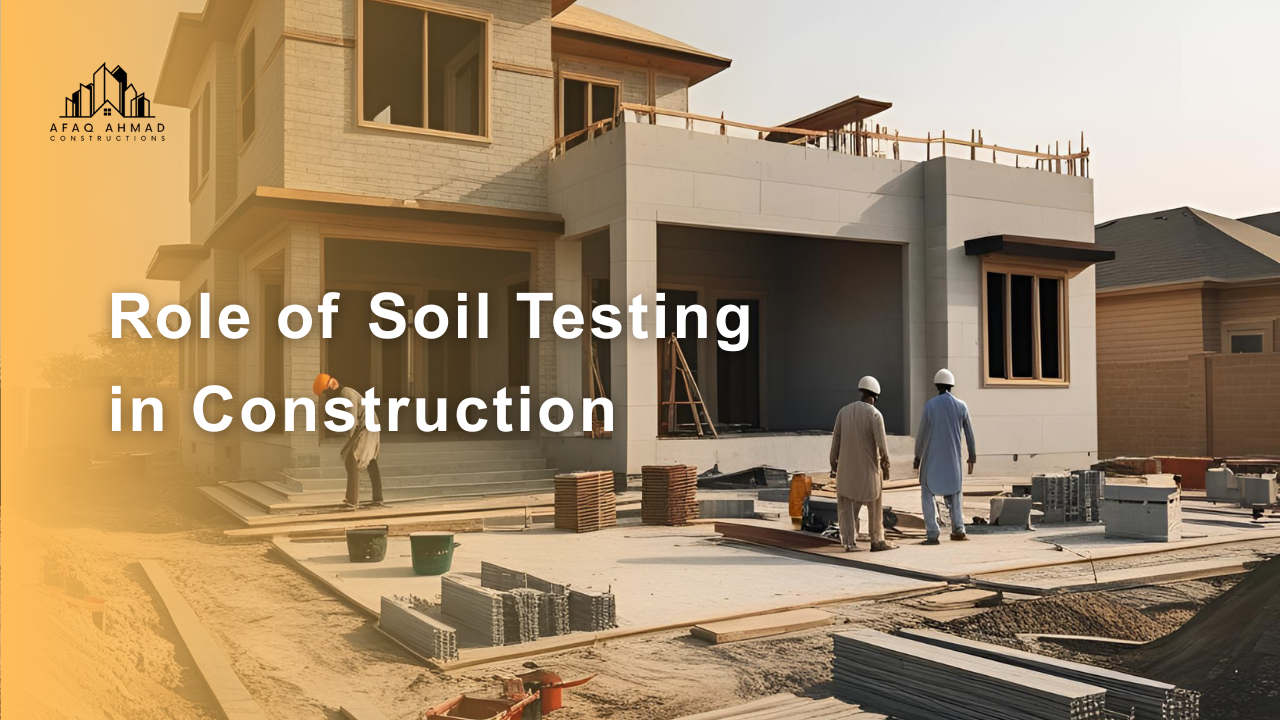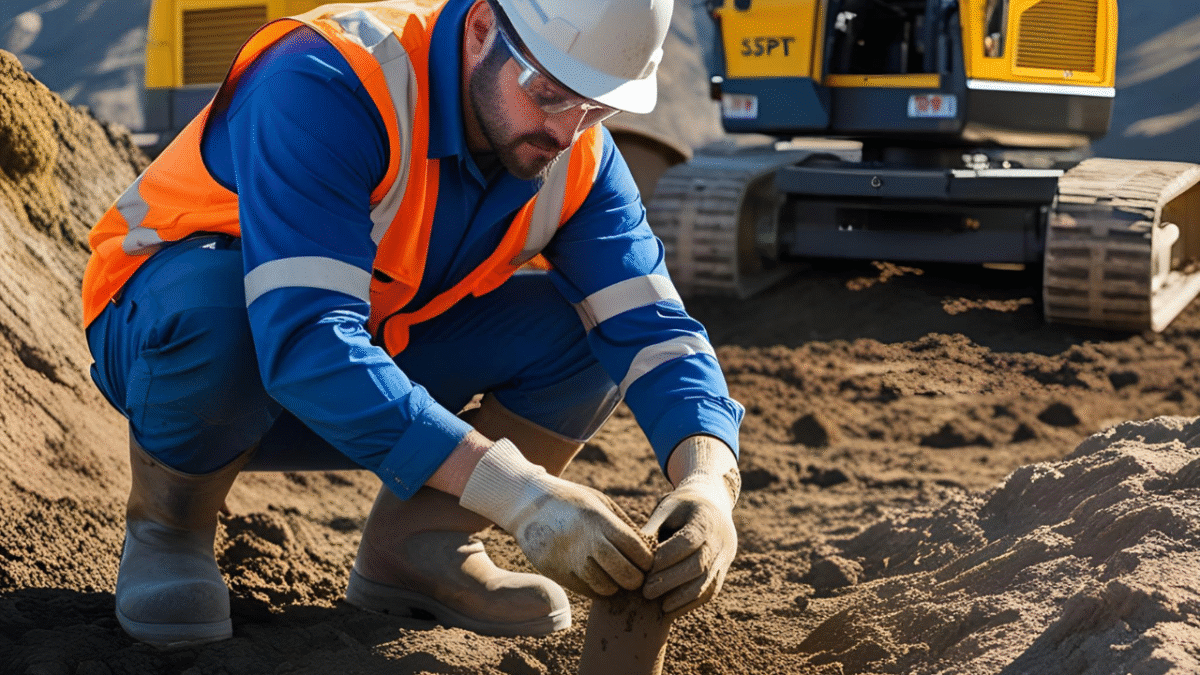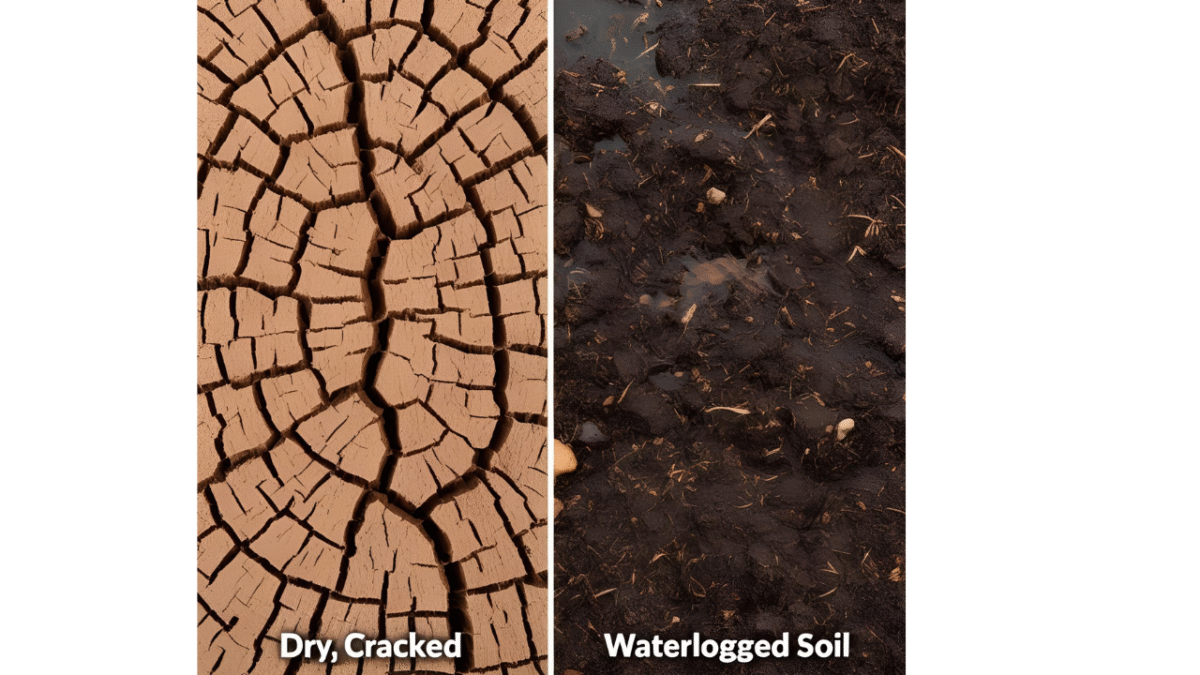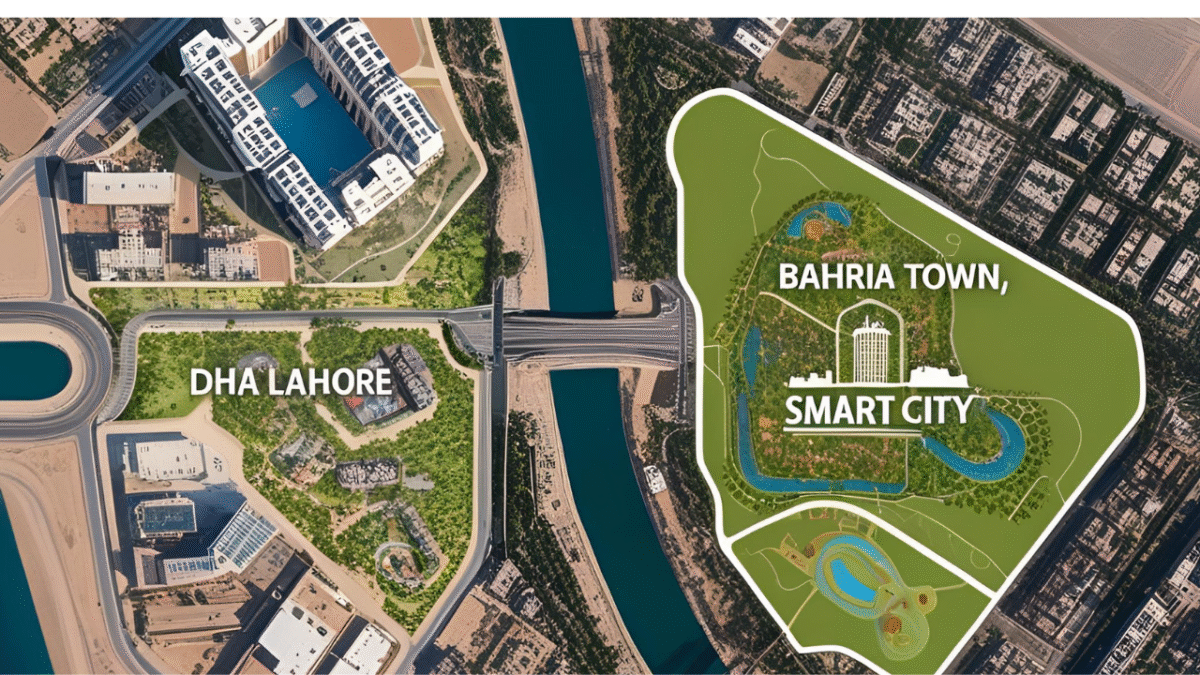
Latest Construction Design Trends in Pakistan 2025
May 17, 2025
Quality Assurance in Construction You Can Trust: Building with Confidence in Pakistan
May 24, 2025
In the bustling construction landscape of Pakistan, where urban development is rapidly transforming cities like Lahore, ensuring a solid foundation for every project is more critical than ever, as temperatures soar and the construction season peaks, the importance of soil testing cannot be overstated. At Afaq Ahmad Constructions, we’ve seen firsthand how this often-overlooked step can make or break a project, especially in a country with diverse soil conditions and environmental challenges. In this blog, we’ll dive deep into the role of soil testing in construction and why it matters in Pakistan, exploring its impact on safety, cost-efficiency, and sustainability, particularly in the context of Lahore’s booming housing societies like DHA Lahore and Lahore Smart City.
Understanding Soil Testing in Construction
Soil testing in construction involves a series of scientific analyses to evaluate the physical, chemical, and geotechnical properties of the soil at a construction site. This process determines critical factors like bearing capacity, moisture content, compaction, permeability, and potential contaminants, which directly influence the design and stability of a structure. In Pakistan, where construction is a key driver of economic growth, soil testing ensures that buildings, bridges, and infrastructure can withstand the region’s unique environmental conditions, from Lahore’s scorching summers to the seismic risks in northern areas.
The process typically includes field sampling—collecting soil samples from various depths—and laboratory testing to assess properties like load-bearing capacity and plasticity. Advanced methods, such as Cone Penetration Testing (CPT) and Standard Penetration Tests (SPT), provide detailed insights into subsurface conditions, enabling engineers to make informed decisions about foundation design and construction techniques.

Why Soil Testing Matters in Pakistan
Pakistan’s construction sector is poised for significant growth, with an annual average growth rate projected at over 5% from 2025 to 2028. However, challenges like rising material costs, a 4.4% market contraction in 2024, and a housing deficit of 10 million units underscore the need for precision in every project. Soil testing plays a pivotal role in addressing these challenges by ensuring structural integrity, reducing risks, and optimizing costs. Here’s why it’s particularly crucial in Pakistan:
1. Diverse Soil Conditions Across Regions
Pakistan’s geography is incredibly varied, from the sandy soils near the Indus River to the black cotton soils in Punjab and the rocky terrains of Khyber Pakhtunkhwa. In Lahore, where rapid urbanization is driving projects in societies like Bahria Town and Lake City, soil composition can vary significantly even within a single city. For instance, areas near the Ravi River may have high moisture content, while filled plots in developing societies like Eastern Housing may lack the strength of natural land. Soil testing identifies these variations, ensuring that foundations are tailored to the specific site conditions, preventing issues like settlement or shifting.
2. Climate and Environmental Challenges
Lahore’s climate, with temperatures exceeding 40°C in summer and heavy monsoon rains, poses unique challenges for construction. High moisture levels can weaken soil stability, while extreme heat can cause soil to contract, affecting foundation integrity. Soil testing assesses moisture content and permeability, helping engineers design foundations that mitigate these risks. For example, in our recent blog on cooling hacks, we highlighted how moisture-resistant flooring like porcelain tiles can complement a well-tested foundation, ensuring long-term stability in Lahore’s humid conditions.
Additionally, seismic activity in northern Pakistan necessitates soil testing to evaluate load-bearing capacity and shear strength, ensuring structures can withstand earthquakes. In 2025, with climate change intensifying weather patterns, soil testing is a critical tool for building resilient infrastructure.

3. Regulatory Compliance and Safety Standards
In Pakistan, soil testing is often a regulatory requirement for obtaining building permits, especially for multi-story buildings and large infrastructure projects. The National Building Code of India, which influences Pakistani standards, recommends soil testing for all constructions, though it’s not always mandatory for smaller projects. However, experts advocate for its inclusion in all approval processes, particularly in earthquake-prone regions. Failing to comply can result in permit denials or stop-work orders, delaying projects and increasing costs.
Beyond compliance, soil testing ensures safety by identifying potential hazards like soil contaminants or unstable ground. For instance, environmental soil testing can detect pollutants like heavy metals, which could compromise concrete and steel stability, as well as pose health risks to residents. This is especially relevant in urban areas like Lahore, where industrial activity may have left behind contaminated soil.
4. Cost-Effectiveness and Risk Mitigation
One of the most significant benefits of soil testing is its ability to save costs in the long run. By identifying soil conditions early, developers can avoid overdesigning foundations or facing costly repairs due to settlement or failure. For example, if soil testing reveals hard rock beneath a site in DHA Lahore, there’s no need for deep excavation, saving both time and money. Conversely, if the soil is too soft, engineers can recommend deeper footings or soil stabilization techniques, preventing future disasters.
In Pakistan, where construction budgets are often tight, soil testing optimizes material usage, ensuring that resources like concrete and rebar are used efficiently. It also reduces the risk of project delays by addressing potential issues before construction begins, a critical factor in a market facing labor shortages and supply chain disruptions in 2025.
Key Soil Testing Methods Used in Pakistan
Several soil testing methods are employed in Pakistan to assess site conditions, each serving a specific purpose. Here are the most common ones, many of which are offered by local firms like Soil Testing Services (STS) and Building Standards Limited:
1. Moisture Content Test
This test measures the amount of water in the soil, which affects its strength and compaction. In Lahore, where monsoon rains are common, understanding moisture levels helps prevent foundation issues like slab heave, where the soil expands and contracts with water changes. The oven-drying method, involving weighing a soil sample before and after drying at 110°C, is widely used for its accuracy.
2. Atterberg Limits Test
This test determines the soil’s plasticity and consistency under varying moisture conditions, crucial for understanding how soil behaves in Lahore’s humid climate. It includes measuring the liquid limit, plastic limit, and plasticity index, helping classify soils and predict their behavior under load.
3. Compaction Test
The Proctor’s Compaction Test evaluates the soil’s ability to be compacted, ensuring a stable foundation. In Pakistan, where filled plots are common in new housing societies like Urban City Lahore, this test ensures that the soil can support the structure without excessive settlement.
4. Load-Bearing Capacity Tests
These tests, such as the Standard Penetration Test (SPT) and Cone Penetration Test (CPT), measure the maximum load the soil can support. STS in Pakistan is notable for offering CPT, a non-destructive method that provides rapid, reliable data on soil stratigraphy and strength, essential for high-rise projects in DHA Lahore.
5. California Bearing Ratio (CBR) Test
The CBR test assesses the soil’s strength for road and pavement construction, a key consideration for infrastructure projects under the China-Pakistan Economic Corridor (CPEC). Building Standards Limited in Pakistan conducts this test to ensure roads in societies like Bahria Town are durable and safe.
6. Permeability Test
This test evaluates the soil’s ability to allow water to pass through, critical for drainage in monsoon-heavy areas like Lahore. Poor drainage can lead to waterlogging, weakening foundations, so this test informs the design of effective drainage systems.
The Role of Soil Testing in Lahore’s Housing Societies
Lahore’s housing societies, as discussed in our previous blog on top societies for investment in 2025, are at the heart of the city’s real estate boom. Soil testing plays a crucial role in ensuring the success of these projects:

DHA Lahore
Known for its luxury homes, DHA Lahore often deals with filled plots and varying soil conditions. Soil testing ensures that foundations can support multi-story structures, preventing settlement issues that could affect property value. Tests like the CBR and load-bearing capacity assessments are vital for the commercial plots in Phase 9 Town, where development is ongoing.
Bahria Town Lahore
With its mix of residential and commercial spaces, Bahria Town requires comprehensive soil testing to support iconic structures like the Eiffel Tower replica. Permeability tests are essential to manage water drainage around the Grand Jamia Mosque, especially during monsoons.
Lahore Smart City
As a tech-driven society, Lahore Smart City integrates soil testing into its smart planning process. Advanced methods like CPT and geophysical surveys ensure that Smart Villas are built on stable ground, aligning with the trend of technology integration we discussed in our construction design trends blog.
Challenges in Soil Testing in Pakistan
Despite its importance, soil testing in Pakistan faces several challenges:
- Lack of Awareness: Many small-scale developers, especially in rural areas, overlook soil testing due to a lack of awareness or perceived costs, increasing the risk of structural failures.
- Inaccessible Sites: Remote or rugged terrains, common in northern Pakistan, make sample collection difficult, requiring specialized equipment.
- Regulatory Gaps: While soil testing is recommended, it’s not mandatory for all projects, leading to inconsistent adoption. Experts advocate for stricter regulations, especially in earthquake-prone regions.
- Cost Concerns: Initial costs for soil testing can deter developers, but as we’ve noted, the long-term savings far outweigh the upfront investment.
The Future of Soil Testing in Pakistan
In 2025, the future of soil testing in Pakistan is promising, driven by technological advancements and a growing emphasis on sustainability. Trends like the use of Building Information Modeling (BIM) and digital twins, as highlighted in our construction design trends blog, are enhancing the accuracy of soil testing by providing detailed subsurface models. Remote sensing and machine learning, as explored in studies on soil type identification in Pakistan, are also gaining traction, allowing for faster and more precise analysis of soil properties.
Government initiatives, such as those under CPEC, are encouraging the adoption of modern testing methods like CPT and ground-penetrating radar (GPR), ensuring that infrastructure projects meet global standards. Additionally, the push for sustainable construction is driving demand for environmental soil testing to identify contaminants, aligning with the eco-friendly design trends we’ve discussed.
How Afaq Ahmad Constructions Can Help
At Afaq Ahmad Constructions, we prioritize soil testing as the foundation of every project. Partnering with leading firms like STS and Building Standards Limited, we ensure that your construction in Lahore—whether in DHA Lahore, Bahria Town, or Lahore Smart City—is built on stable, tested ground. Our team provides comprehensive geotechnical investigations, from field sampling to laboratory analysis, delivering detailed reports that guide foundation design and construction. Contact us today to ensure your project starts on the right foot.
Conclusion
Soil testing is a non-negotiable step in Pakistan’s construction landscape, particularly in a dynamic city like Lahore. By assessing soil properties, mitigating risks, and ensuring regulatory compliance, it lays the groundwork for safe, cost-effective, and sustainable projects. In 2025, as Pakistan’s construction sector grows, embracing soil testing—along with modern trends like smart technology and sustainability—will be key to building a resilient future. Don’t let an untested foundation jeopardize your dream home or investment. Let Afaq Ahmad Constructions help you build with confidence.





